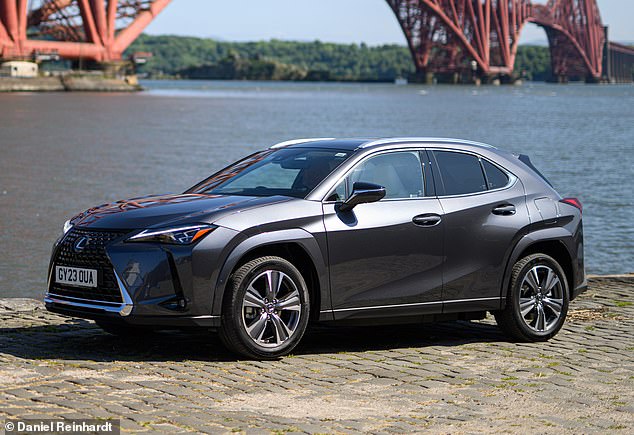Japanese luxury car brand Lexus has significantly cut the price of its electric and hybrid models this week in an effort to boost sales.
With the current EV market underpinned by huge fleet demand (many of them made up of drivers using low-tax salary sacrifice schemes through their employers), Lexus has cut its prices to increase appeal to private buyers.
The biggest saving, of more than £7,000, comes on the company’s smallest EV model, which it looks set to sell in greater numbers.
Electric car sales: Lexus has slashed the price of its UX300e EV by up to £7,100 in a bid to boost demand
The UX300e now starts at £40,795, down from £47,495 – a saving of £6,700.
However, higher-spec variants have dropped even further in price, down to £7,100.
Savings can also be had on the larger RZ450e, with Lexus cutting prices by £2,100 to £57,895 for the standard version.
Prices for hybrid models have also been cut to attract Britons to dealerships.
The NX450h+ and RX450h+ plug-in hybrid models have seen price discounts of around £5,000, dropping from £54,950 to £49,995 and from £67,100 to £63,995 respectively.
The only model to avoid cuts is the new LBX, which was recently voted Which Car? of the Year 2024.
Lexus says the decision was made to make “premium electrified automotive technology accessible and affordable to more customers.”
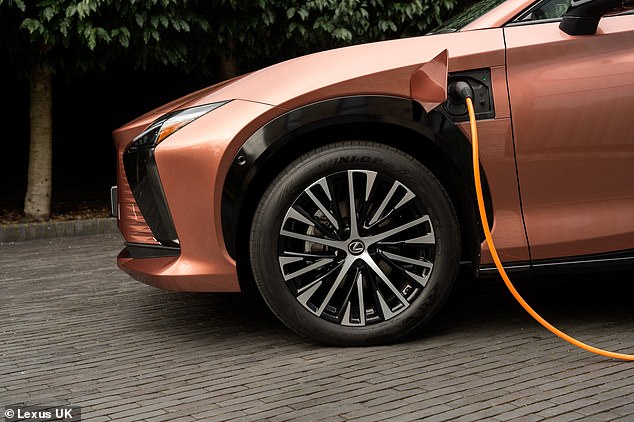
With the current EV market supported by huge fleet demand (many of them made up of drivers using low-tax salary sacrifice schemes through their employers), Lexus has cut its prices to increase appeal to private buyers.
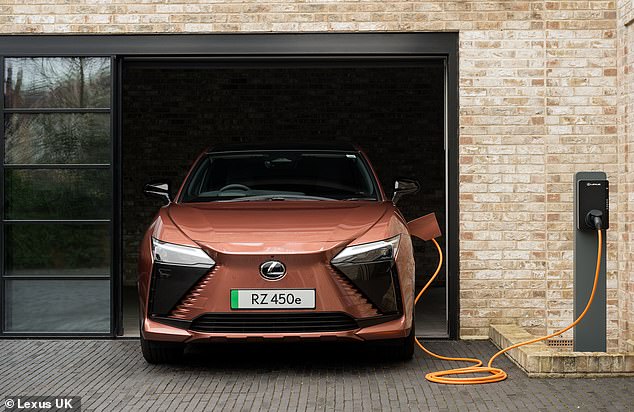
Savings can also be made on the larger RZ450e, with Lexus knocking £2,100 off the entry price to £57,895.
Chris Hayes, Lexus UK Director, said: ‘At a time when people have become all too accustomed to rising prices, we are pleased to be bucking the trend and delivering genuine reductions in the cost of ownership of our leading battery electric and plug-in hybrid models.
‘The improved pricing comes with no compromise – customers can be assured of the same high levels of quality, reliability and customer service that have long distinguished our brand in the premium car market.’
In reality, the price adjustments have likely been introduced to stimulate waning demand among private buyers, especially when it comes to electric vehicles.
Official figures released by the Society of Motor Manufacturers and Traders showed new car sales in June passed the one million mark – the first time registrations have surpassed the seven-figure mid-year milestone since 2019 before the pandemic.
However, last month’s statistics also showed that the new car market (across all fuel types) is being kept afloat by fleet registrations, which rose 14.2 percent year-on-year, while private sales fell 15.3 percent.
By mid-2024, three in five (59.6 percent) of new cars on the road have been registered in fleets (600,404 units), while only 38 percent have been purchased by the public through dealerships and websites (382,881 units). The remainder have been purchased by businesses.
In the case of electric vehicles, the difference between sales to fleets and sales to individuals is even greater. In fact, less than one in five new electric vehicles registered are purchased from individuals.
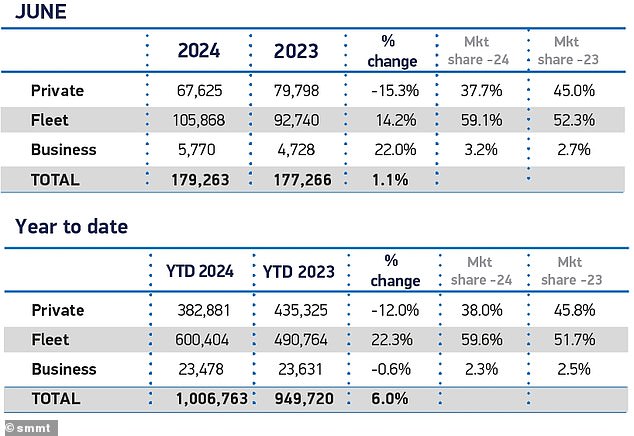
The latest SMMT figures show that three in five new cars sold in Britain in 2024 are registered to fleets. Only 38% of new models are bought by private buyers.
That said, Lexus isn’t doing badly at all in terms of UK sales.
In fact, with 8,036 units sold between January and the end of June, the Japanese manufacturer – which is Toyota’s sister luxury brand – has increased the registration volume achieved in the same period in 2023 by 20% (6,715 sales).
The price cuts should therefore put Lexus on track to beat its best UK sales record achieved last year, which was 15,963 cars.
And the brand is also in a good position in terms of adherence to the New rules on the sale of zero-emission vehicles are being introduced this year.
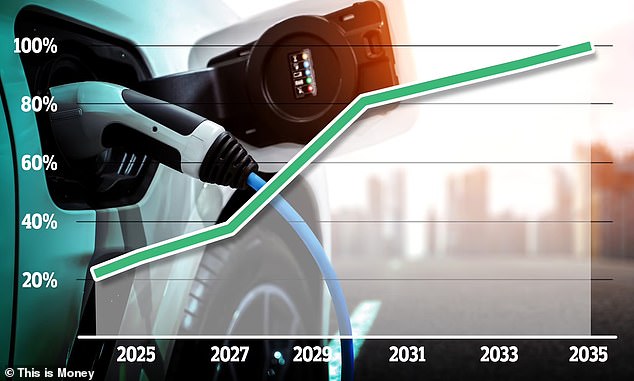
Major carmakers, including Lexus, must sell a minimum of 22% electric vehicles by 2024, or else face large fines from the UK government. However, the Japanese brand is thought to be well ahead of this year’s threshold.
Major carmakers need a minimum 22 per cent share of EV registrations by 2024. Failure to meet this target could result in fines of £15,000 per vehicle below the threshold.
Lexus’ EV share is currently around 30 percent, which exceeds the requirement for next year.
The zero-emission vehicle (ZEV) mandate, enacted in January, currently requires manufacturers to sell an increasing share of electric cars each year, rising to 28 percent in 2025, 52 percent in 2028, 80 percent by the end of the decade and 100 percent in 2035.
However, doubts remain over these targets – and the mandate as a whole – after Labour’s manifesto said it would reintroduce a 2030 deadline for banning sales of new petrol and diesel cars if it took power, significantly changing zero-emission vehicle targets for carmakers.
Ford said in May it would consider bringing fewer gasoline cars to the UK market to forcefully improve its share of electric vehicle sales.
A month earlier, Carlos Tavares, chief executive of Stellantis (the parent group of Vauxhall, Citroën, Peugeot and other major car brands) said the UK’s ZEV mandate could see Stellantis reduce the number of cars it sells in Britain, refusing to even rule out stopping sales of some models altogether.

Some links in this article may be affiliate links. If you click on them we may earn a small commission. This helps us fund This Is Money and keep it free to use. We do not write articles to promote products. We do not allow any commercial relationships to affect our editorial independence.


